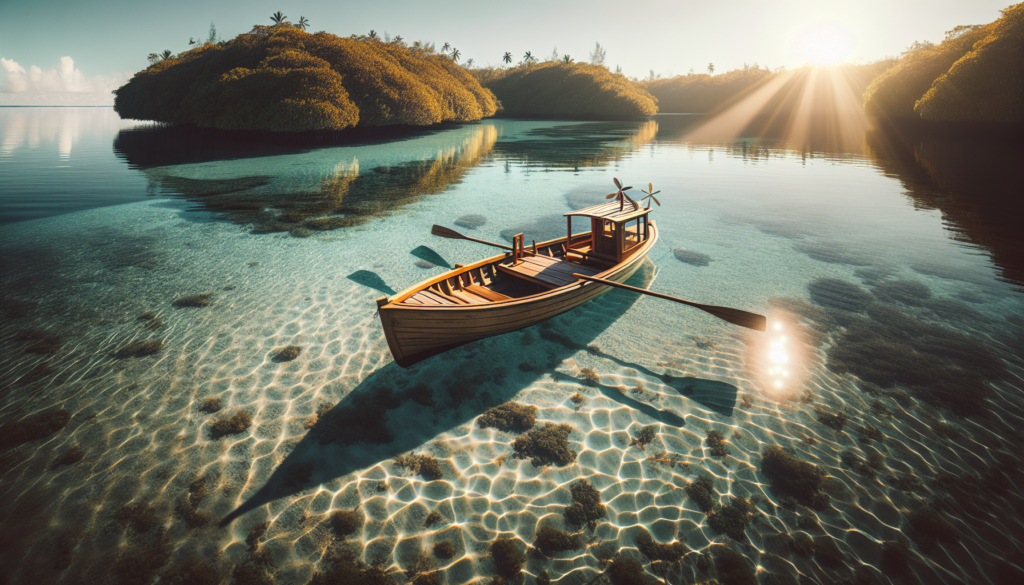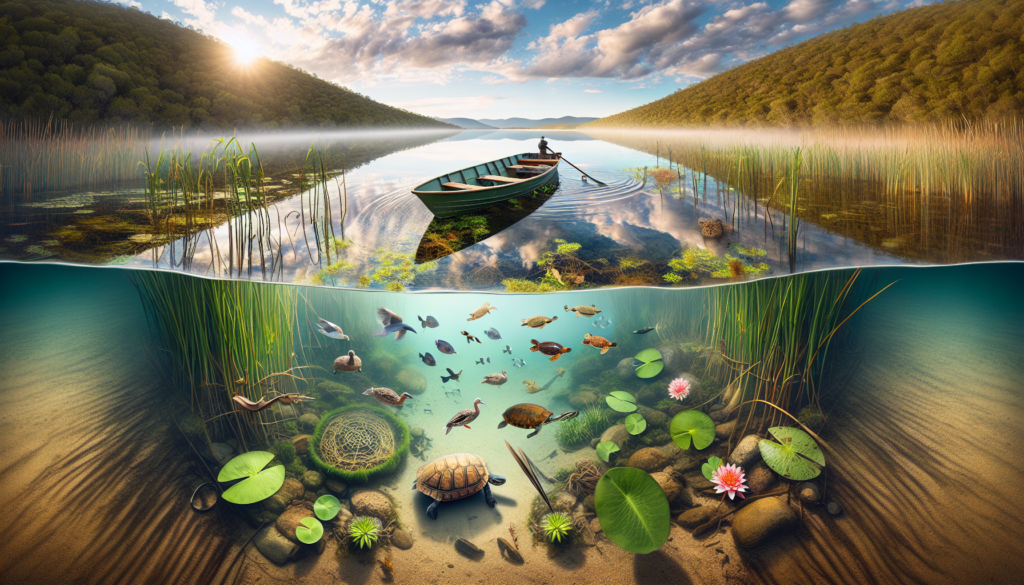Embracing an environmentally conscious lifestyle doesn’t stop at land; it extends to the heart of the waters you navigate too. Your article, “eco-friendly boating Practices In Shallow Water Environments,” prepares you to steer your boat with eco-friendly practices in marine environments. It enlightens you about the strategies you can adopt to minimize your boating activity’s harmful impacts on these delicate water environments. With instructions laid out from choosing the right kind of boat, its engine, speed, to the cleaning agents for its maintenance, this write-up navigates you towards an environmentally responsible boating experience.

Understanding Shallow Water Environments
Before we dive into eco-friendly boating, it’s essential to understand what shallow water environments entail.
Description of Shallow Water Environments
When you hear the term ‘shallow water environments’, rivers, lakes, and coastal areas probably come to mind. These water bodies, usually not particularly deep, provide habitats for a rich diversity of plants and animals. They act as transitional zones between the land and deep water bodies, and despite their relatively small coverage area, they have a tremendous impact on global biological diversity.
Importance of Shallow Water Ecosystems
You might wonder why these shallow waters are of such importance. Well, these ecosystems play a pivotal role in food chains, support various industries like fishing, tourism, increase water quality, and act as natural flood buffers. Besides, shallow water ecosystems are nursery grounds for marine life, essential for their life cycle and survival.
Threats and Challenges Faced by Shallow Water Ecosystems
Unfortunately, these critical ecosystems face myriad threats and challenges. Pollution, habitat destruction, erosion, sedimentation, introduction of invasive species, and climate change deplete these environments of their unique biodiversity and disturb their normal functioning. Among these threats, one that requires immediate redress is the pollution and disturbances caused by boating activities, particularly in these sensitive environments.
The Impact of Boating on Shallow Water Ecosystems
Boating, while a recreational and commuting boon, tends to harm these delicate ecosystems. Here’s how:
Types of Pollution from Boating
Boating contributes to environmental pollution in several ways. Direct pollutants include oil, grease, fuel, antifreeze, and sewage discharged from boats. Indirect pollutants include sediment stirred up by boat propellers, waste generated onboard like plastic trash, and noise pollution disturbing the marine life.
Consequences of Erosion Caused by Boating
Boating activities, especially at high speeds, can cause waves that result in shoreline erosion, destroy aquatic habitats, and alter the ecosystem’s landscape. These waves can wash away crucial nutrients needed for the ecosystem’s health and also lead to the proliferation of harmful algal blooms.
Damage to Aquatic Life
The effects on aquatic life are just as harmful. Propellers can inflict severe injury on aquatic organisms. The noise and light pollution from boats can disrupt the behavior, habitat occupancy, and biological rhythms of marine life.
Water Quality Degradation
Boating activities can significantly degrade water quality. This is through pollution from oils, chemicals, and waste from boats. The disturbed sediment can cloud the water decreasing its quality, affecting the organisms living in it and those depending on it.

Benefits of Eco-Friendly Boating
The good news is, you can still enjoy boating without causing such harmful impacts, through eco-friendly boating. Here are its benefits:
Reduced Carbon Footprint
Compared to traditional boats, eco-friendly boats produce fewer greenhouse emissions, reducing your carbon footprint. This is crucial in the fight against climate change.
Conservation of Aquatic Biodiversity
Eco-friendly boats, which make less noise and release fewer pollutants, are a lot friendlier to aquatic biodiversity. They provide a chance for damaged ecosystems to recover and thrive again.
Enhancement in Water Quality
Eco-friendly boats contribute to maintaining and enhancing the water quality. This is due to the reduction of pollutants such as oils, waste, and sediment disturbances.
Promotion of Recreational Activities
Using eco-friendly boats means you can still partake in and promote recreational activities such as boating and fishing, but in a sustainable way. And who doesn’t love guilt-free fun?
Choosing the Right Eco-Friendly Boat
So, how do you go about selecting the right eco-friendly boat?
Factors to Consider when Selecting a Boat
You should consider the boat’s fuel efficiency, choice of material, waste management system, and propulsion system. Also, think about the purpose of the boat. Is it for personal use, or do you intend to carry passengers?
Comparison between Traditional and Eco-Friendly Boats
Unlike traditional boats, eco-friendly boats utilize renewable energy sources (like solar, wind, or electric power), non-toxic materials, and advanced designs for efficiency and minimal environmental impact. However, the initial cost might be higher for eco-friendly boats, but lower operating and maintenance costs often make up for this.
Emerging Technology in Eco-Friendly Boating
Keep an eye out for emerging technologies in this sector, such as hybrid systems, battery-powered engines, solar panels, and biodegradable materials. These innovations are making eco-friendly boating even more efficient and sustainable.
Best Brands for Eco-Friendly Boats
There are numerous brands with an impressive selection of eco-friendly boats. Some leaders include Arcadia Yachts with their solar-panel featured boats, X Shore with their 100% electric boats, or Scout Boats focusing on sustainability in build and design.

Adopting Cleaner Boating Fuels
Another great way to be eco-friendly while boating is by choosing clean boating fuels.
Drawbacks of Traditional Marine Fuels
Traditional marine fuels like diesel and petrol significantly contribute to pollution, they emit harmful gases like carbon dioxide and methane that not only pollute the air we breathe but also intensify global warming.
Introduction to Cleaner and Renewable Fuels
Cleaner and renewable fuels, such as biofuels and hydrogen, can mitigate these problems. These eco-friendly fuels release fewer pollutants and greenhouse gases and are sustainable alternatives.
Benefits of Switching to Cleaner Boating Fuels
By switching to cleaner fuels, you reduce pollution, depend less on fossil fuels, and play your part in promoting renewable energy sources. This contributes to healthier environments and climate change mitigation.
Maintaining Eco-Friendly Boats
Proper maintenance of eco-friendly boats is critical, ensuring their impact on the environment remains minimal.
Proper Maintenance Practices
Regular checks and fixing of leaks, correct disposal of waste, using non-toxic cleaning products, and keeping the boat’s hull clean and smooth to reduce drag are key maintenance practices.
Importance of Regular Cleaning
Regular cleaning prevents harmful foreign substances from entering water bodies and reduces the need for harsh cleaning products that might harm the water life.
Guidelines for Disposal of Boat Waste
Correct disposal of waste is paramount. This includes using pump-out facilities to empty the sewage tank, not throwing litter overboard, and discarding old equipment at proper disposal sites.
Minimizing the Use of Harmful Cleaning Products
Opting for non-toxic, biodegradable cleaning products helps maintain water quality and the health of aquatic organisms.

Navigational Practices for Protecting Shallow Water Environments
Protecting shallow water environments goes beyond having an eco-friendly boat. Your navigational practices matter too.
Understanding and Respecting Marine Boundaries
Respect marine boundaries to protect sensitive natural habitats. Follow zoning rules and avoid no-boating areas.
Keys to Avoid Grounding and Collision
To avoid grounding or collisions that damage seafloor habitats, always keep an updated chart, use electronic navigation systems, and keep a proper lookout, especially in unfamiliar or shallow waters.
Low-Speed Boating in Sensitive Areas
Maintaining low speeds in shallow water areas and near shorelines can reduce risks of erosion and damage to aquatic life.
Encouraging Public Participation in Eco-Friendly Boating
Spreading awareness about eco-friendly boating can help protect our waters and marine life.
Organizing Community Clean-Ups
By organizing clean-up drives, communities can remove waste from water bodies, raising awareness of the impact of littering on these ecosystems.
Creating Awareness about Eco-Friendly Boating
Share information about the effects of traditional boating practices and the benefits of sustainable alternatives. This could inspire more people to get on board with eco-friendly boating.
Promoting Educational Programs and Training
These programs can provide knowledge and skills needed to practice eco-friendly boating and help cultivate a culture of conscious boating.
Policy and Regulatory Frameworks Guiding Eco-Friendly Boating
Eco-friendly boating is also influenced by the policy and regulatory framework in any given region.
Role of Government in Promoting Eco-Friendly Boating
Governments play a significant role. By promoting clean fuels, renewable energy, offering incentives for eco-friendly boats, and investing in research and development, they can help shift the course towards sustainability.
Major Regulations and Guidelines
Boaters should be familiar with the main regulations and guidelines about waste disposal, emissions, and navigational practices. These rules protect our environment and help maintain the quality of our water bodies.
Consequences of Non-Compliance with Regulations
Non-compliance can lead to penalties, but more importantly, it harms the delicate balance of our water ecosystems. It’s is vital to understand and respect these regulations.
Conclusion and Future Prospects
Summarizing the Importance of Eco-Friendly Boating
In conclusion, eco-friendly boating is not just a trend but a necessary shift in perspective and practice. By being more mindful of our boating practices, we can enjoy time on the water without compromising the health and longevity of our ecosystems.
Innovative Developments to Look Forward To
As we welcome more technological advancement, we can look forward to even more eco-friendly boating solutions; quieter engines, energy-efficient designs, renewable energy-powered systems, and self-cleaning materials.
Growth and Challenges to Eco-Friendly Boating
While the shift toward eco-friendly boating is promising, it will not be without challenges. Costs, lack of infrastructure and information, and resistance to change remain hurdles. However, through continued education, policy reform, and technological advancement, the future of eco-friendly boating looks promising. Let’s navigate this path together, for the sake of our planet!

